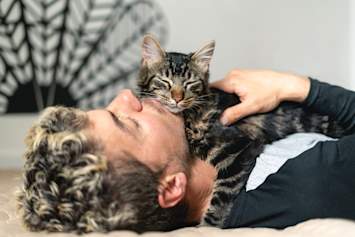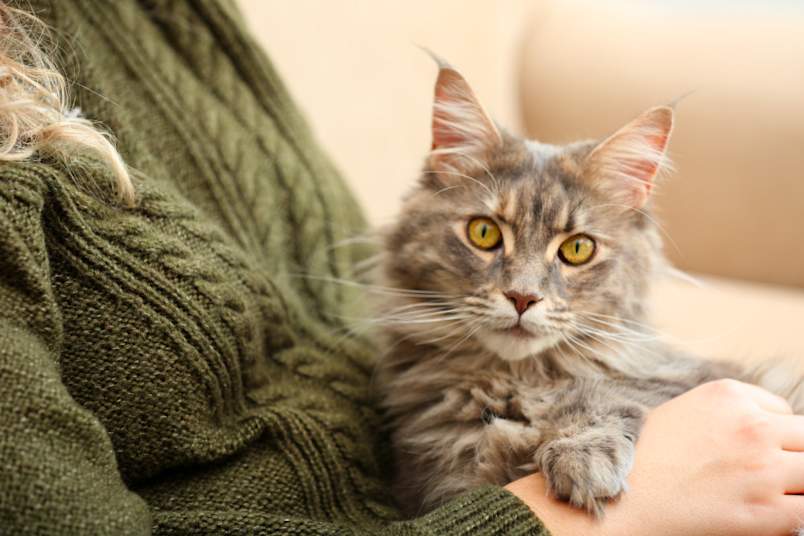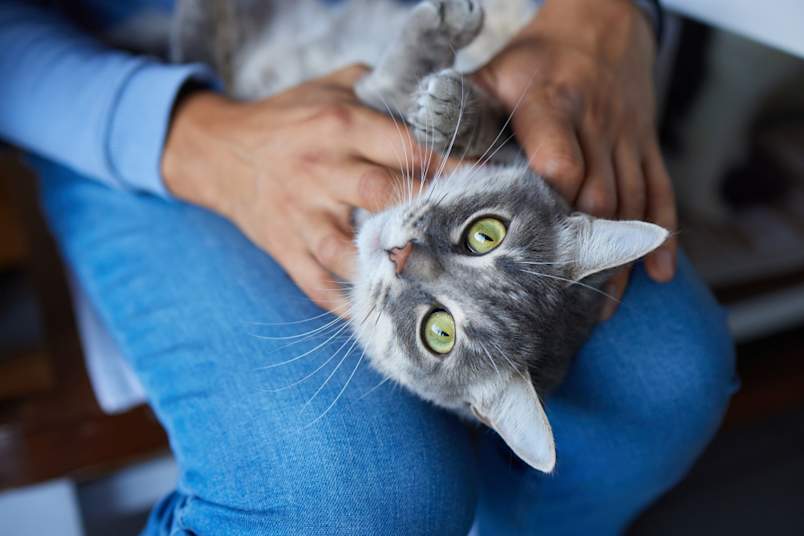
Questions abound when the topic of Emotional Support Animals comes up, especially when determining where, when, and how ESA owners can exercise certain rights to accommodation. The Americans with Disabilities Act provides the best clarity for these labels and the appropriate accommodation for each. An emotional support animal provides support and companionship to owners, relieving the effects of conditions such as depression, anxiety, and phobias. Emotional support animals are not limited to dogs, a cat can be an emotional support animal too! They also do not perform specific assistive tasks or have specialized training, but rather simply exist to provide support and companionship necessary to their owner’s general wellbeing.
It’s important to note that the ESA label, regardless of species, is not interchangeable with Service animal—species limited to dogs and specially trained miniature horses—and therefore ESAs are not entitled to the same access and accommodation as Service Animals. For instance, an ESA does not have to be accommodated in a store, restaurant, or even business offices or educational institutions. Accommodation does, however, have to be made in housing and air travel.
Having a cat can be emotionally beneficial, especially for cat lovers struggling with loneliness, depression, or anxiety. Cat owners who are curious about how to register their cat as an emotional support animal should know there is no official, legal certification. However, a pet owner may be able to work with a healthcare provider and mental health professional to secure a doctor's note indicating the animal’s presence provides emotional benefit to the owner and reasonable accommodation in housing or air travel should be given when appropriate.
Veterinarians are not involved in the ESA process, though proper veterinary care should always be maintained, and vaccination certificates should be kept up to date for all animals, including ESAs.

Emotional Support Cats: Benefits and Registration
Benefits of Emotional Support Cats
Pet owners are often enthusiastic to report that their pets improve their emotional well-being, in fact an American Psychiatric Association poll revealed 86% of cat owners believed their cats positively impacted their mental health. These pet owners said their cats help reduce stress and anxiety, and provide support and companionship beyond what a typical human companion might be able to provide.
Cats are notoriously independent and often considered low maintenance, but can still provide emotional balance, consistency, low-pressure interaction—and it’s easy to develop a bond of trust and affection with them.
How to Register an Emotional Support Cat
The A.D.A. is the ruling entity for service and emotional support animals and does not endorse any certification or registration of either. The only formal documentation may be a letter from a healthcare provider or mental health care provider. For emotional support cats, it would explain that the handler has a disability and having the animal accompany them is necessary to their mental health or treatment. This letter can be used to seek accommodation for housing or airline travel
There is no legally supported registration or certification.
To obtain a letter for Emotional Support Animal accommodation, the pet owner must work with a qualified mental health professional, who can provide comprehensive care, which will help them determine that an emotional support cat is appropriate.
Can Cats Be Emotional Support Animals?
A cat with reasonable temperament and no interfering health conditions can serve as an emotional support animal. Cat personalities vary and some may be more suitable for this role than others. Those amongst the friendliest cat breeds may be ideal candidates. Cats with their own major health conditions or even emotional disorders (anxiety, fear aggression, compulsive disorders) may not be suitable to provide emotional support for their owners since they have conditions of their own that may even be stressful for their owners to manage.
Cats offer a calming presence and easy companionship. Cats make especially good emotional support animals for pet owners who may be allergic to or afraid of dogs, or whose housing isn’t suitable for a dog, such as a small apartment.
Emotional support animals, though, are not limited to just dogs and cats. There are situations where emotional support rodents (hamsters, rats, chinchillas), emotional support reptiles (bearded dragons or non-venomous snakes), or other emotional support animals are more appropriate or beneficial to their owners.
Emotional Support Cats vs. Service Animals
While Emotional Support Cats can provide innumerable benefits to their owners, they are not the same as service animals and are not entitled to the same accommodations. The difference between Emotional Support and Service Animals is that Service Animals perform specific tasks related to their owner’s disability, tasks that are essential to regular function. Emotional Support Animals however, do not perform any specialized tasks and simply exist in their owner’s presence to provide some mental health benefits.

Emotional Support Cat Housing and Travel Rights
Housing Rights
The Fair Housing Act (FHA) is what protects people with disabilities from housing discrimination, and this includes accommodation for those with Service Animals or Emotional Support Animals. Accommodating SAs and ESAs means allowing pets to live with their owners in the dwelling, even if the property normally doesn’t allow pets. It may also include waiving pet deposits. Landlords can require documentation of the animal’s status as a Support or Service Animal.
Travel Accommodation for Emotional Support Cats
The Air Carrier Access Act (ACAA) dictates that Service Animals and Emotional Support Animals should be allowed in the aircraft cabin, within reason. Owners who are traveling should always check with the airline well in advance of travel and may be required to provide documentation that they have a disability and the reason for the animal’s accompaniment.
There are circumstances under which accommodation may not be granted, which is why checking with the airline in advance of travel is strongly encouraged. Airlines can decide not to accommodate if they determine that the animal’s species (livestock, primates, etc) or size/ weight are a health and safety risk. Accommodation is not required for unusual species including snakes, other reptiles, ferrets, rodents, and spiders, and non-domestic carriers are not required to accommodate any species other than dogs.
Registering Your Cat as an Emotional Support Animal
The most important step for designating your cat as an Emotional Support Animal involves seeking treatment from a qualified mental health professional. They’ll often work with you to determine the nature of your needs and create a comprehensive treatment protocol, which may or may not include a recommendation for your pet to become an emotional support animal, or a recommendation for you to obtain an emotional support animal. If you don’t already have a cat who is a reasonable candidate, some basic research can help you determine how much cats cost and what the cost of care may be over the lifetime of your new friend.
The mental healthcare provider can provide a letter that indicates you have a mental health condition and that the animal is important to the management or treatment of the condition (they don’t have to specify what the condition is).
The letter is, really, all you would need to obtain reasonable accommodation where necessary. Because the cat is an Emotional Support Animal, they are not entitled to the same accommodation as a Service Animal, but the letter from your mental healthcare provider should be sufficient for housing and airline travel where possible.
There are numerous websites that offer “official” ESA certification, but their services are not official. These internet resources might offer formal looking certificates or identification cards and tags, but those accessories aren’t necessary for designating an animal as an ESA.

The Importance of Mental Health and Emotional Support Cats
Animals are increasingly recognized as key contributors to human health and wellness. This has led to increased awareness of the benefits of Emotional Support Animals, and a movement toward widespread certification of companion animals so their owners can seek reasonable accommodation. While official certification isn’t offered by the A.D.A., mental healthcare providers play an integral role in deciding if an ESA could be beneficial for their patients, giving access to accommodation for those with otherwise “invisible” disabilities.
Healthcare for Emotional Support Cats
While fulfilling important needs for their owner’s healthcare, Emotional Support Cats need their own healthcare needs considered.
Emotional Support cats may sometimes be at increased risk for exposure to diseases or injury. Embrace cat insurance can make affording non-wellness visits and even routine healthcare easier for pet owners who would benefit from the support. The cost of veterinary care depends on how often you take a cat to the vet, but just like companion cats, Emotional Support Cats should receive routine annual vaccines, parasite preventives, and other routine healthcare on a typical veterinarian-recommended schedule. A lifetime of care adds up over time, so to keep your cat healthy and safe for the long haul, consider the annual cost of care plus possible emergencies, compared to how long cats live, and you’ll easily see how affordable pet insurance can mean your cat continues providing essential emotional support throughout a long and happy life.